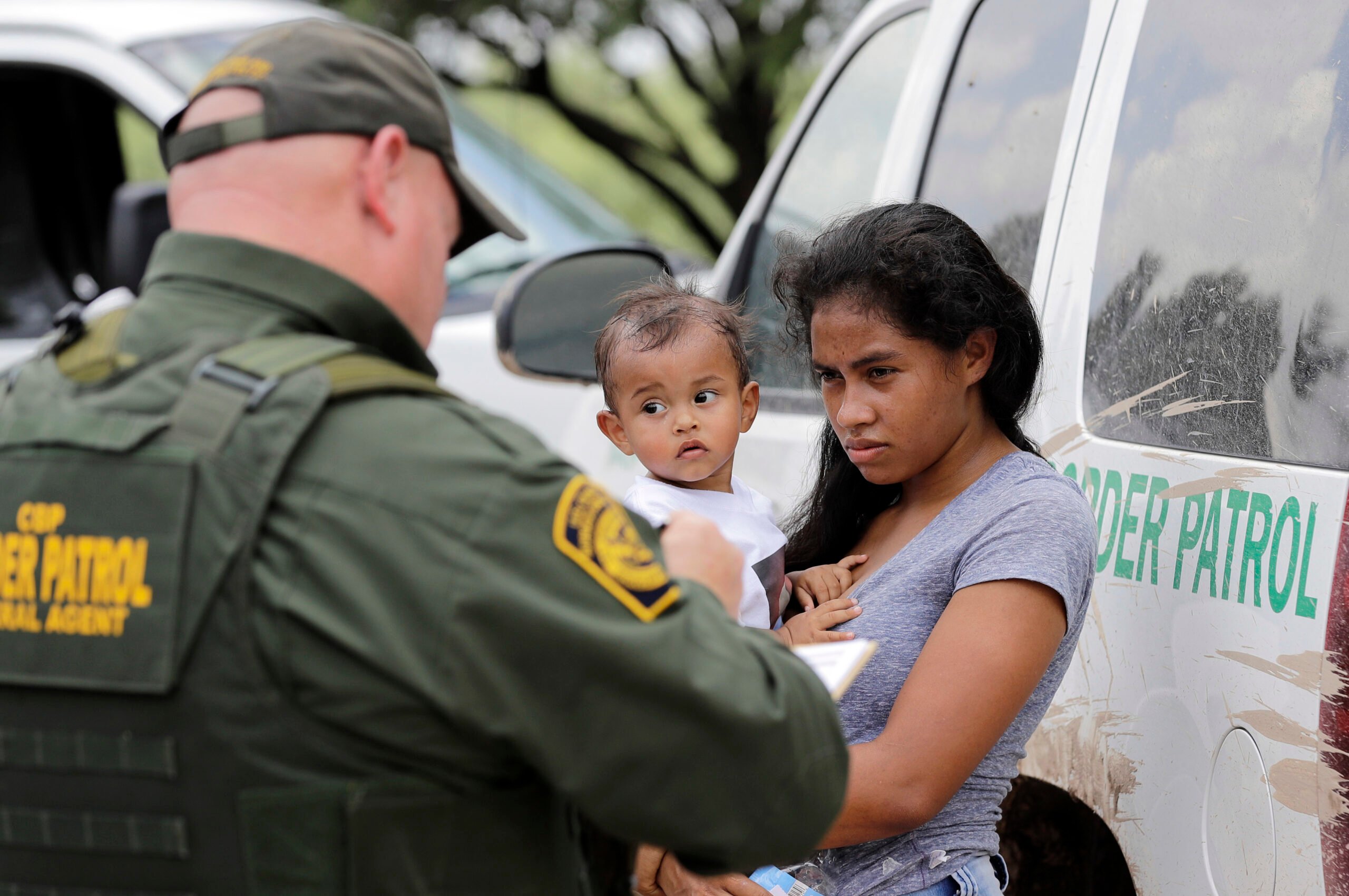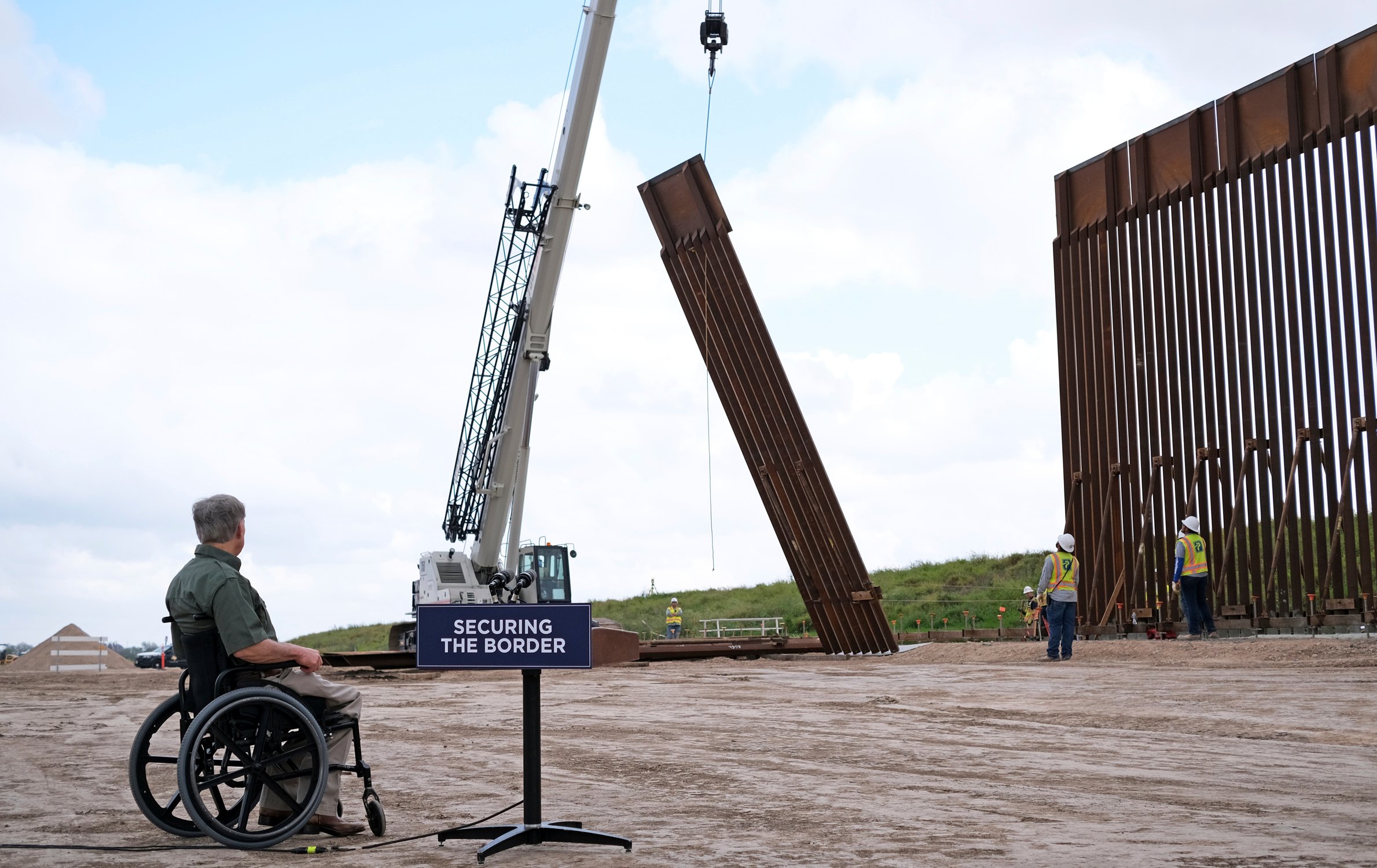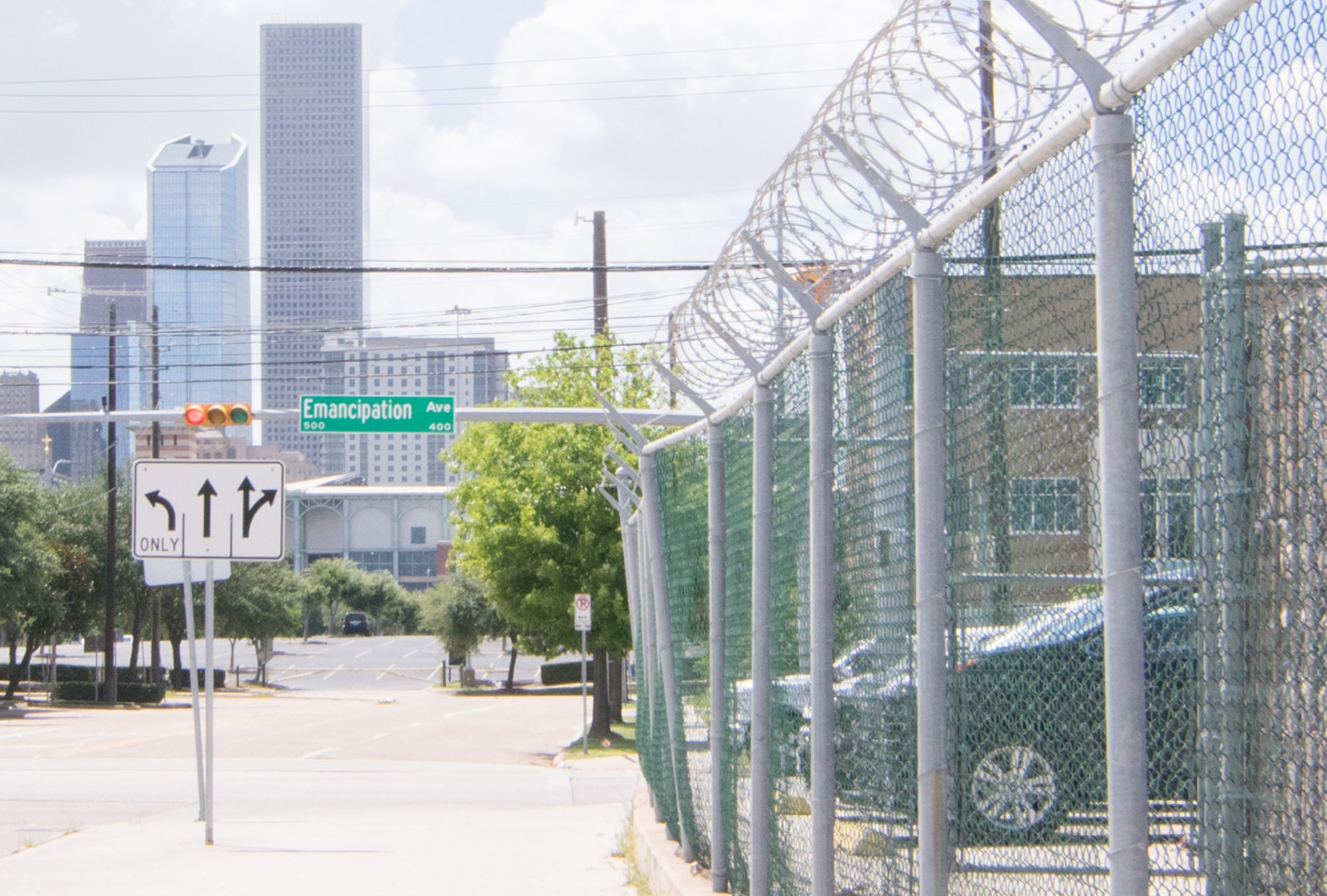
‘Civil and Human Rights Disaster’: Texas Wants to Seize Immigration Authority from Feds
House Bill 4 would turn local police into border enforcers—with new unchecked power.

November 7 Update: Amid Republican infighting between the leaders of the state House and Senate, House Bill 4 died as both chambers adjourned sine die on Tuesday without the bill having received a full Senate vote. Governor Greg Abbott promptly announced an additional special legislative session, starting Tuesday evening, including a call for a measure like House Bill 4 to criminalize illegal entry and reentry and authorize “the removal of illegal immigrants from Texas.” In response, lawmakers filed identical versions of an updated bill titled, respectively, House Bill 4 and Senate Bill 4.
November 1 Update: On Wednesday, state Senator Brian Birdwell—a Republican from Granbury, more than five hours by car from the Texas-Mexico border—introduced an amended version of House Bill 4 in the Senate Committee on Border Security. The new version stripped provisions, approved last week in the state House, that would have allowed state and local police officers to effectively deport individuals suspected of entering the country illegally. The updated bill also removed a proposed criminal charge for illegal reentry.
The new bill, however, would still make it a misdemeanor crime for unauthorized migrants to improperly enter Texas from a foreign nation—which attorneys and advocates say flies in the face of legal precedent that gives the federal government exclusive authority over immigration enforcement. It would also require judges to order that the state transport individuals, after they’ve completed criminal sentences for violating this law, to “federal authorities at the nearest port of entry for return to the person’s country of origin or the foreign nation from which the person entered or attempted to enter.”
At Wednesday’s hearing, Birdwell attempted to allay concerns that HB 4 would be enforced around the state and lead to widespread racial profiling. The senator stated he intends the bill to be applied at or near the Rio Grande, often in cases where the officer directly witnessed the improper crossing. But attorneys and advocates insisted the plain language of the bill would still allow statewide enforcement by unqualified local law enforcement officers.
“You kind of can’t put lipstick on this pig,” said Lisa Graybill, VP of Law and Policy at the National Immigration Law Center. “House Bill 4 impermissibly makes a person’s immigration status an issue to be tried before state court.”
The Senate committee passed the revised bill on a 3-2 vote Wednesday. The measure now must pass the full Senate before likely returning to the House for the lower chamber to consider the changes.
In an email following the committee hearing, HB 4’s House author David Spiller told the Observer that the bill is a “work in progress,” adding: “There are some components of the Texas House’s version of the bill—specifically being the authority to order the removal of aliens arriving here illegally—that I feel need to remain in the bill.”
Original Story: As Texas continues to lead the nation in residents without health insurance, its public school system faces a financial crisis deepened by a right-wing drive for privatization, and its infrastructure is bent to breaking each season by new extremes of heat and cold, the state’s GOP-run Legislature has struck a blow for progress on a decidedly unrelated issue: usurping the federal government’s prerogative to set and enforce the nation’s immigration laws.
Last week, following a tense marathon of a House floor debate partway through the Lege’s third special session this year, the state’s lower chamber passed House Bill 4 in the wee hours of the morning. The bill, which authorizes state and local police to arrest or deport suspected unauthorized migrants, represents an inflection point in a now-years-long political turn against immigrants by the Republican Party of Texas, a state where nearly one in five are foreign-born. The measure is also a likely attempt to get the U.S. Supreme Court to overturn Arizona v. United States, which reaffirmed the federal government’s exclusive authority to enforce immigration law. HB 4 is scheduled for a committee hearing Wednesday morning in the archconservative state Senate, which may modify it.
“It feels like a coming civil and human rights disaster,” said Roberto Lopez, an advocacy manager at the Texas Civil Rights Project. “Not only does it criminalize people for being undocumented in Texas, it also … encourages mass profiling of people, especially on the border, but potentially across the entire state of Texas.”
“Not only does it criminalize people for being undocumented in Texas, it also … encourages mass profiling of people, … potentially across the entire state.”
HB 4 creates new state crimes for improperly entering or reentering the United States. Comparable crimes exist under federal law and are enforced by the federal government—in fact, strict enforcement of these laws was the mechanism for Trump’s family separations policy—but a state doing so would shatter the legal status quo. Under HB 4, a migrant who braves the Rio Grande could be arrested by state troopers, sheriff’s deputies, or local police and face up to 6 months in jail or longer for repeat offenses.
In a shockingly novel twist, state and local officers under HB 4 may choose to forego arrest and instead transport a suspected migrant to an international bridge and order the individual to cross into Mexico. Refusing to do so would constitute a separate felony charge.
“[The deportation procedure] makes officers the police, prosecutor, judge, jury, and executioner,” said David Donatti, a senior staff attorney at the ACLU of Texas. “And it’s very scary and unprecedented and a massive wielding of state power without any kind of check or accountability.”
HB 4’s primary application might be right along the Texas-Mexico border, with officers arresting migrants they’ve just witnessed cross the river. But the bill’s language itself, attorneys and critics said, provides no such limitations. As passed by the House, the measure could lead to police arresting or removing migrants all over the state—even months or years after individuals entered or reentered the country.
Donatti also pointed to a portion of the bill that frees police from financial liability by requiring state and local governments to foot the bill for civil and criminal cases against officers over their enforcement of HB 4. “If your conscience doesn’t stop you from expelling this family, then perhaps the prospect of liability [under federal civil rights law] might. … This even takes away that shred of accountability or potential accountability,” he said.
Thanks to a floor amendment, HB 4 does prohibit enforcement via “push[ing] a child into water” but does not explicitly prohibit doing so to an adult. It also restricts enforcement at sites where sexual assault survivors are receiving forensic testing but not at domestic violence shelters.
At the border, the bill would likely lead to Texas law enforcement scooping up asylum-seekers before they get a chance to present their claim to federal officers, said Nina Perales of the Mexican American Legal Defense and Educational Fund (MALDEF). It also raises the specter of Trumpian family separations, she said, which in 2018 were carried out by breaking parents away from children so the former could be criminally prosecuted for federal illegal entry.
Statewide, the bill would empower local police officers to attempt to suss out immigration status, which can be quite complex. Some individuals may even be on a path to legal status after being deported. “Basically, a local police officer is not equipped to make this determination under any circumstances,” said Barbara Hines, former director of UT-Austin’s immigration law clinic.
The measure’s deportation process may also be unworkable, Hines added, noting that Mexico could refuse to accept migrants who hail from other countries such as Venezuela, Haiti, Cameroon, or dozens of others from which refugees have fled.
Attorneys told the Texas Observer that the bill appears to be, at least in part, a sort of bait for the U.S. Supreme Court. Both Texas Governor Greg Abbott and Attorney General Ken Paxton have voiced the desire for the Court to revisit a 2012 decision titled Arizona v. United States. In that ruling, the justices largely struck down an Arizona bill that attempted broadly to deputize state and local police as immigration enforcement officers. The 2012 decision, attorneys said, reaffirmed the federal government’s exclusive control over immigration and helped define the guardrails for interactions between police and undocumented immigrants.
“I think everyone agrees [HB 4] is preempted under current law. … One of the things the Supreme Court said Arizona can’t do is authorize state and local police to make immigration arrests,” said Perales.
“It’s a frontal assault on our immigration laws,” summarized Hines.
“It’s a frontal assault on our immigration laws.”
Reached by phone, the bill’s author Representative David Spiller—a Republican from Jacksboro, some six hours by car from the border—defended his proposal. While the bill is statewide in scope, he said he expects “95 percent” of enforcement “would probably be within 50 miles of the border,” often in cases where the officer directly witnessed the improper crossing. He also claimed he is not looking to overturn the Arizona legal precedent; he believes HB 4 actually complies with the ruling since it aligns with federal illegal entry and reentry statutes. “I’m not looking to overturn Arizona. If someone wants to challenge this, let’s get it on … because I feel that it is completely constitutional,” he said.
Spiller also rebuked claims the measure would lead to racial profiling. “This is not about race. This is about the safety and security of our country, and it’s about Texans taking matters into their own hands and protecting Texans,” he said.
Kristin Etter, a criminal defense attorney and special project director at Texas RioGrande Legal Aid, said HB 4 would “absolutely” apply statewide and could lead to arrest and removal of “anybody who is an immigrant or who appears to be an immigrant.”
Etter described the bill as an escalation of Operation Lone Star—Abbott’s nearly three-year-old, $10-plus-billion border scheme—in which the state has tried to use criminal trespassing charges as a means of rounding up migrants. “It’s Operation Lone Star on steroids,” she said. “It’s like a further escalation of the weaponization and misappropriation of the criminal justice system in Texas in an attempt to punish and deter immigration.”
Earlier this year, a state legislative measure that would have deputized ordinary civilians to join in the reactionary fun of Operation Lone Star was ultimately defeated in Texas’ regular legislative session. For the current special session, the governor called for bills criminalizing illegal entry and raising criminal sanctions for human smuggling.
The late-night House debate over HB 4 became contentious when Republicans moved to limit discussion of the measure. Houston Democrat Armando Walle went so far as to tell GOP legislators: “Y’all don’t live in our fucking skin.”
The tension and following hours of emotional testimony from Democrats were reminiscent of the 2017 House debate over Senate Bill 4, the measure that banned so-called sanctuary cities in Texas. That year, a GOP lawmaker—now Texas GOP Chair Matt Rinaldi—called Immigration and Customs Enforcement (ICE) on Latino protesters, and a physical altercation ensued.
Thanks to 2017’s SB 4, Texas county sheriffs today cannot stop ICE from taking custody of undocumented arrestees when they would otherwise be released, and city police chiefs cannot prohibit their officers from asking for residents’ citizenship papers. If this year’s House Bill 4 becomes law, many local communities in Texas may wish they could enact such protections.
Editor’s note: This story has been updated with additional comment on House Bill 4.



